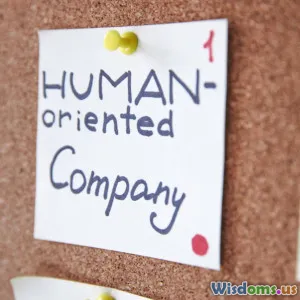
Aligning Your Career Path With Personal Values Explained
14 min read Discover how to align your career path with your core personal values for fulfillment and professional growth. (0 Reviews)
Aligning Your Career Path With Personal Values Explained
Choosing a career is one of the most significant decisions you'll make in your life. Despite common advice urging us to pick roles based on salary or prestige, true fulfillment at work often comes from alignment between what you do and who you are. Understanding what personal values are, embracing their significance, and precisely connecting them to your career can lead to satisfaction, resilience, and meaningful success. In today's rapidly changing professional landscape, aligning your job and your values isn’t a luxury—it's smart career strategy.
The Impact of Values on Career Satisfaction

Personal values are the core beliefs that drive your decisions, shape your behavior, and guide what you see as meaningful. Examples include honesty, creativity, autonomy, social responsibility, achievement, or family. When these foundational aspects clash with your daily work, you may feel drained or conflicted. Conversely, alignment can produce motivation and a lasting sense of purpose.
Numerous studies affirm this connection. According to a 2022 Harvard Business Review survey, 84% of respondents said feeling their work matched their values increased their job satisfaction, while a mismatch contributed to burnout and disengagement. For instance, people who value creativity might thrive in roles with autonomy and innovation, struggling in heavily regulated or routine-driven industries.
Jane’s Story: Jane, an engineer passionate about environmental stewardship, found advancement in the oil industry unrewarding despite excellent pay. She transitioned to a renewable energy startup, accepting a lower salary, and subsequently reported greater well-being and commitment. Her story echoes the findings that value alignment strongly predicts happiness and retention.
Identifying Your Core Values

The first step toward values alignment in your career is clear articulation of what truly matters to you. Many professionals underestimate this step, overlooking the less obvious drivers beneath their career choices.
Reflection Exercise:
- List ten moments—personal or professional—when you felt most fulfilled. Dig beneath the surface: Were you helping others? Challenging yourself? Innovating? Teaching?
- Identify patterns. Are themes like teamwork, security, risk-taking, or recognition recurring?
- Narrow your list to five core values.
There are also robust online tools, such as the VIA Survey of Character Strengths and Barrett Values Centre assessments, which offer in-depth frameworks. Trusted friends and mentors can be sounding boards; their outside perspective may help clarify what you value versus what you think you “should.”
Consider this scenario: Sam, mid-career and successful in corporate law, realized through reflection that he deeply valued social impact and mentorship. Identifying these priorities prompted a shift to pro-bono work and legal education, yielding greater satisfaction.
Mapping Values to Career Opportunities

Once core values are defined, the next challenge is finding career paths and organizations that support them. Not all companies or roles are created equally in terms of culture and mission.
Research and Due Diligence:
- Use company reports, mission statements, and employee reviews (e.g., Glassdoor, Indeed) to gauge cultural fit. Firms like Patagonia, known for environmental and social responsibility, suit those who value sustainability.
- Evaluate organizational culture: Is collaboration prized or is it a more hierarchical, individualistic environment?
Job Description Analysis: Pay attention to daily tasks, performance metrics, and benefits detailed in job listings. Are there growth and learning opportunities for the curious? Is there community engagement for those passionate about impact?
Informational Interviews: Reach out to current or former employees. Tailor questions to probe value alignment:
- “How does your organization support work–life balance?”
- “Can you offer examples of how feedback or innovation is promoted?”
Real-World Example: Large tech companies like Google and Salesforce promote creativity and flexibility, which fit values like autonomy and innovation. Conversely, public service or non-profits like Teach For America enable those who prioritize social contribution and equity.
Bridging Gaps: When Jobs and Values Don’t Align

Sometimes, due to necessity or circumstance, your position may not fully reflect your values. Instead of impulsively jumping ship, consider pragmatic steps toward better alignment:
- Negotiate Role Changes: Approach your manager about incorporating tasks that better reflect your strengths or interests.
- Pursue Internal Mobility: Many large companies support cross-departmental moves. Someone passionate about sustainability, working for a retail firm, might transition from finance to environmental compliance.
- Side Projects and Volunteering: You can satisfy values outside of work, enhancing both skills and overall fulfillment. For instance, if your job lacks a sense of community or purpose, volunteering with local organizations can fill the void.
Adaptive Mindset: Temporary misalignment is a reality for many workers. The key is focusing on aspects you can control while building toward a future where values and work harmoniously integrate. Keep an updated log of what energizes or depletes you, and revisit your values. Has a season of life—parenthood, a move, or new passions—shifted what you prioritize?
The Business Case: Why Employers Favor Value-Driven Employees

For forward-thinking employers, supporting value alignment isn’t mere altruism—it's sound business. Research from Deloitte shows that purpose-driven organizations post 30% higher innovation rates and 40% greater workforce retention. When employees feel connected to their work, they're more likely to go the extra mile, support colleagues, and innovate.
Many leading companies actively recruit for “culture add”—those whose values complement and extend organizational strengths. For example, HubSpot screens candidates not just for technical prowess, but for attributes like transparency and empathy that dovetail with their mission.
Similarly, Salesforce’s Volunteer Time Off (VTO) initiative taps into employees’ desire for community impact, building loyalty and high engagement scores.
For Job Seekers: Identifying companies making values a central part of their culture rewards more than personal well-being. Employees report stronger emotional health, deliver better customer outcomes, and attract similarly aligned teammates.
Overcoming Barriers to Values-Based Career Decisions

Despite clear benefits, professionals may experience doubt or external pressure when considering values-driven choices:
- Financial Security Concerns: Not all value-aligned roles are high-paying, particularly social impact or creative paths. Mitigate risk by budgeting, upskilling, or crafting a portfolio career (combining several roles).
- Skepticism from Others: Family, friends, or colleagues may undervalue your priorities. Counter this by sharing stories of successful transitions, showcasing tangible positive outcomes like well-being or skill development.
- Fear of Change: Career pivots can be daunting. Break the process into manageable experiments: shadowing, short online courses, freelance gigs. Each step provides insight without full commitment.
Mentorship as a Tool: Seasoned advisors or coaches can provide validation and practical guidance. Many successful transitions stem from support networks, such as women's professional associations or career groups.
Tips for Sustaining Alignment Over Time
Identifying values isn't a one-time event. Life—and by extension, values—evolve. To maintain alignment:
- Regular Reflection: Check in quarterly or annually. Has a new work experience or life phase reshaped your priorities?
- Adjust Goals: Early career may value learning and autonomy, but mid-career may prioritize legacy or stability.
- Document Wins and Lessons: Maintain a career journal of key decisions, outcomes, and emotional responses. This provides concrete data for course-correcting.
- Celebrate Small Victories: Recognize when your work and values overlap, no matter how small. It builds resilience for times when they're out of sync.
Continuous Development: Upskill in areas that reinforce your core values. For example, if innovation matters, take part in hackathons or creative challenges, or pursue certificates in design thinking or entrepreneurship
Realigning in a Changing World

The modern working world is more dynamic than ever. Trends like remote work, digital transformation, and globalized teams present new value-based opportunities:
- Remote Roles: People valuing flexibility or family can thrive in organizations offering work-from-home.
- ESG Initiatives: Sustainability and ethics have moved to the forefront, with corporations prioritizing ecological and social governance. Those valuing ecological impact will find niches—many previously unavailable—across finance, tech, and manufacturing.
- Diversity and Inclusion: Today’s best employers pursue diverse voices and perspectives, supporting values like equality and cultural competency.
Case in point, after the pandemic, Lisa, an HR manager valuing autonomy and wellness, negotiated a hybrid role and successfully piloted corporate mental health initiatives. Her proactive alignment enhanced her results and positioned her for a senior leadership role.
Concrete Steps to Begin Aligning Today

Ready to align your career path with your personal values? Here’s a practical checklist to get started:
- Clarity: Complete a values assessment (self-reflection or online tool).
- Research: Identify industries, roles, and organizations that resonate.
- Networking: Arrange informational interviews to learn about culture and fit.
- Goal Setting: Set short-term and long-term alignment goals.
- Test & Learn: Take small risks—side projects, committees, new certifications—that align with top values.
- Seek Mentors: Connect with those who have made successful, values-based moves.
- Iterate: Periodically reassess both your values and your professional trajectory.
The journey to a value-aligned career is both finite and ever-evolving. The time you invest in clarifying and pursuing what matters most won’t just improve your days at work—it will shape the very core of a purposeful life. The real measure of career success is not merely a title or paycheck, but the satisfaction of knowing your work is authentically yours.
Rate the Post
User Reviews
Popular Posts



















